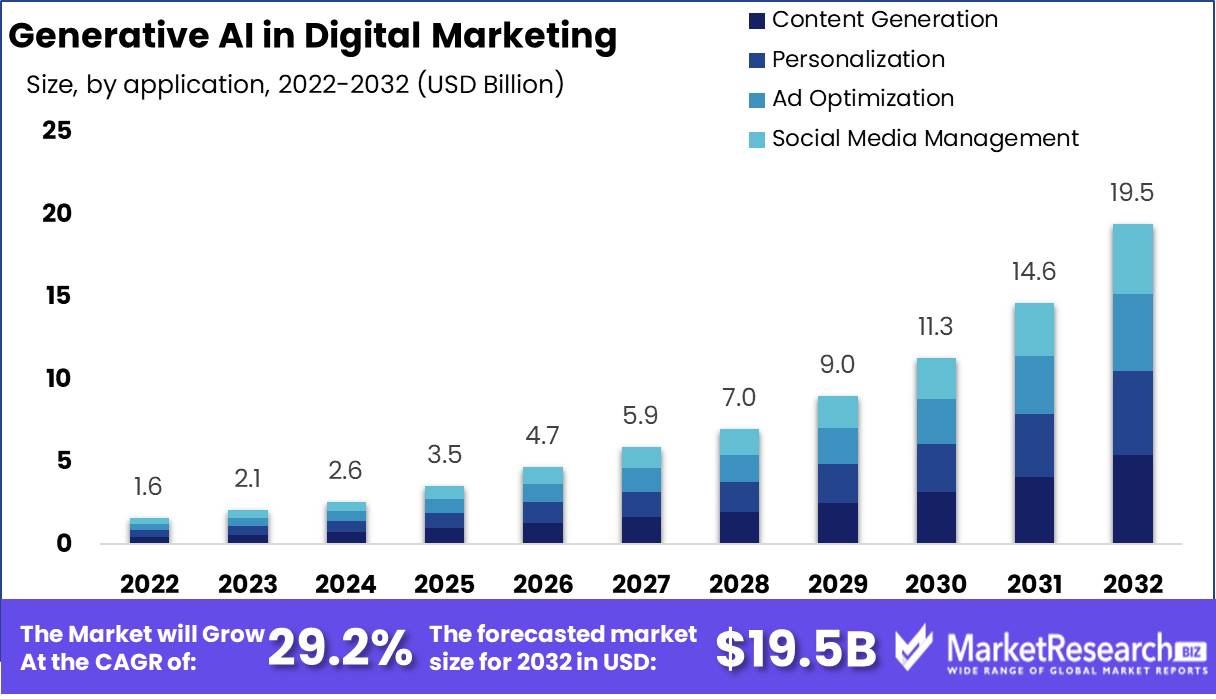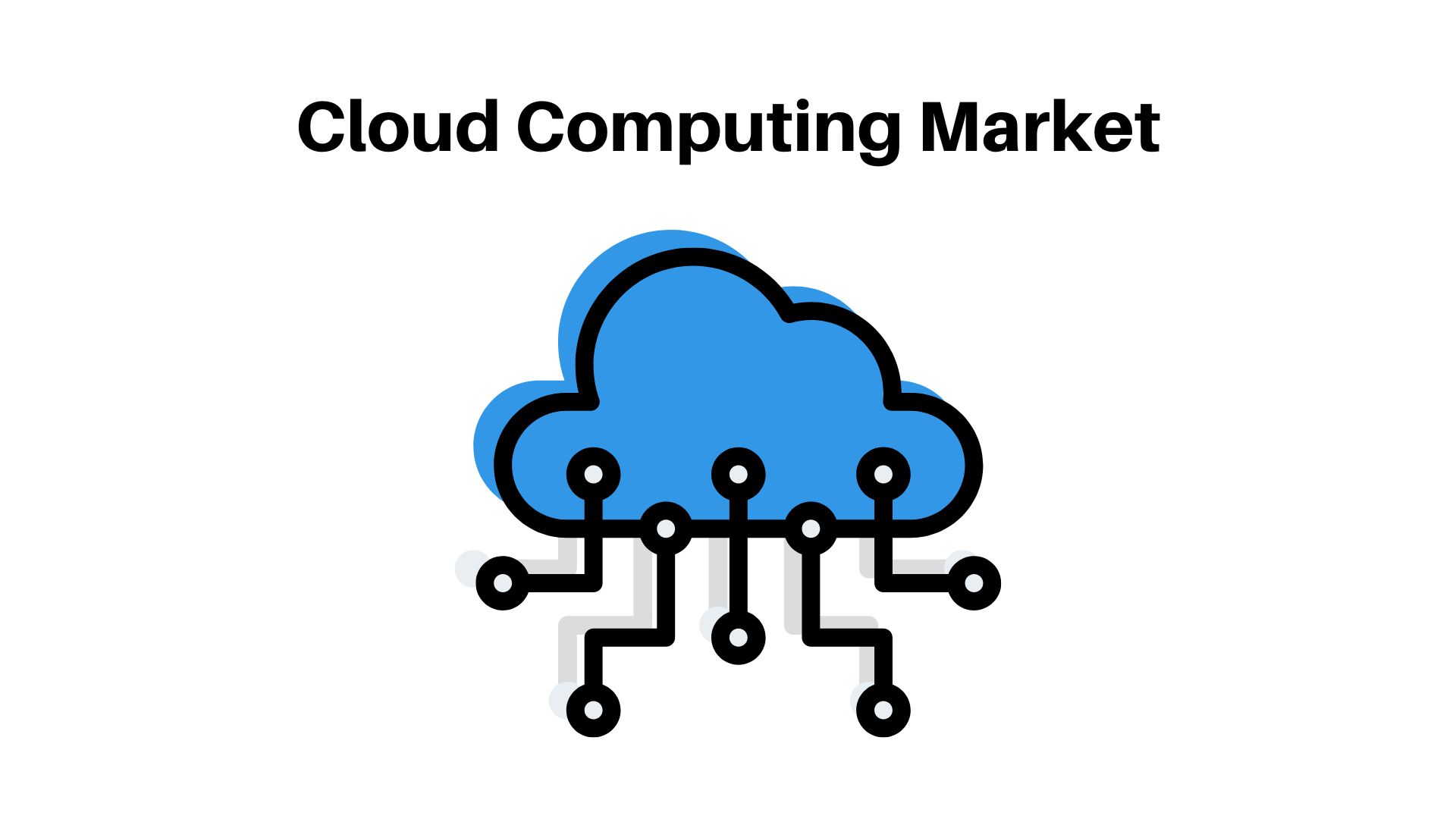Generative AI in Digital Marketing Market to Witness Positive Growth at 29.2% CAGR & USD 19.5 Bn Valuation In 2032

Page Contents
Market Overview
Published Via 11Press : Generative AI in Digital Marketing Market size is expected to be worth around USD 19.5 Bn by 2032 from USD 1.6 Bn in 2022, growing at a CAGR of 29.2% during the forecast period from 2022 to 2032.
Generational AI in digital marketing has revolutionized how businesses reach and engage with their target audiences. Equipped with cutting-edge machine learning algorithms, Generative AI enables marketers to automate and optimize various aspects of their campaigns for maximum efficiency, personalization and effectiveness.
Generative AI technology has revolutionized the creation of advertising content. Leveraging natural language processing and image recognition capabilities, AI systems can generate compelling ad copies and visually appealing creatives tailored to specific customer segments using natural language processing or image recognition capabilities. Not only does this save marketers both time and resources but it ensures their ads resonate with individual users thus increasing engagement rates and conversion rates.
Generational AI has made an important contribution in campaign optimization. AI-powered tools analyze vast amounts of data such as historical campaign performance, customer behavior and market trends to adjust ad placements, messaging and targeting parameters dynamically in real time for maximum return on investment and improve overall campaign performance.
Generative AI has made digital marketing more personalized. AI systems analyze user preferences, behavior patterns and contextual data in order to produce highly targeted advertisements that deliver an engaging and relevant user experience resulting in higher conversion rates and customer satisfaction.
Generative AI has enabled marketers to automate marketing processes. Marketers can utilize AI-powered tools for repetitive tasks like content production, social media scheduling and email marketing – saving both time and ensuring consistency and accuracy in marketing efforts while freeing them up for strategic planning and analysis.
Integration of Generative AI into marketing platforms and software has significantly simplified marketing workflow. AI-powered solutions integrate easily with existing marketing tools, enabling marketers to utilize its capabilities without the extensive technical knowledge or resources required to do so. This accessibility has democratized the use of Generative AI digital marketing for businesses of all sizes to take advantage of its benefits.
Request Sample Copy of Generative AI in Digital Marketing Market Report at: https://marketresearch.biz/report/generative-ai-in-digital-marketing/request-sample

Key Takeaways
- Generative AI for digital marketing automates and optimizes campaign processes to save marketers both time and resources.
- AI-powered tools generate eye-catching ad copies and creatives tailored specifically for specific customer segments, increasing engagement rates and conversion rates.
- Campaign optimization with generative AI analyzes large volumes of data to dynamically adjust ad placements, messaging and targeting parameters – ultimately increasing ROI and driving business success.
- Personalization in digital marketing can be strengthened using generative AI, creating ads tailored specifically to user preferences and behaviors.
- Automating marketing processes using AI-powered tools saves time while guaranteeing consistency and accuracy in marketing efforts.
- Generative AI integrates seamlessly with existing marketing platforms and software, making it accessible to businesses of all sizes.
- AI-generated content and automation allow marketers to focus on strategic planning and analysis instead.
- As generative AI advances, its role in shaping the future of digital marketing should increase, leading to increased efficiency and effectiveness.
Regional Snapshot
- North America leads in adopting Generative AI technologies in digital marketing, with major tech hubs like Silicon Valley driving innovation in this space. Businesses throughout this region use Generative AI to improve personalization, automate marketing processes, and enhance campaign performance.
- European nations such as the UK, Germany and France have adopted artificial intelligence for use in digital marketing. Data privacy regulations are a top priority here and AI technologies help ensure compliance while creating personalized marketing campaigns with precision targeting.
- Asia Pacific countries such as China, Japan and India have rapidly adopted artificial intelligence-powered digital marketing. Companies operating within this region leverage AI technologies to reach and engage diverse consumer segments as well as explore influencer marketing tactics with artificial intelligence-powered campaigns.
- Latin American countries, including Brazil, Mexico and Argentina are rapidly adopting artificial intelligence into their digital marketing strategies. AI tools are helping businesses in Latin America automate processes, improve customer targeting and deliver tailored marketing campaigns across platforms.
- Middle East and Africa businesses are gradually adopting artificial intelligence in digital marketing, thanks to the growth of e-commerce and digital transformation. Businesses are making use of AI technologies to optimize ad campaigns, enhance customer engagement and gain a competitive edge in the market.
For any inquiries, Speak to our expert at: https://marketresearch.biz/report/generative-ai-in-digital-marketing/#inquiry
Drivers
Personalization and Targeting
Generative AI allows marketers to develop highly tailored marketing campaigns. By analyzing user data like browsing behavior, purchase history and demographic details, AI algorithms are able to generate content tailored specifically for individual consumers – increasing engagement and conversion rates as people respond more readily when messages align with their interests and preferences.
Automation and Efficiency
AI-powered marketing tools automate various marketing processes, helping marketers save both time and resources. For instance, tasks such as content production, social media scheduling and campaign optimization can all be expedited through AI tools – eliminating manual processes while increasing efficiency so marketers can focus more strategically on activities such as campaign planning and analysis.
Improved customer Experience
Generative AI plays an indispensable role in providing customers with an exceptional and personalized customer experience. By analyzing customer data and behavior patterns, AI algorithms can generate recommendations, offers, and interactive content tailored specifically to customer satisfaction – strengthening brand-customer relationships while simultaneously building loyalty among repeat buyers and driving repeat business.
Enhanced Decision-Making
Generative AI offers marketers valuable insights and recommendations that can inform data-driven decision-making. AI algorithms can analyze massive volumes of data to recognize patterns, trends, and correlations that people often miss – helping marketers optimize campaigns, refine audience targeting strategies and develop more impactful content strategies based on hard data insights.
Restraints
Data Privacy and Ethics
Digital marketing utilizing Generative AI requires accessing consumer data. Unfortunately, assuring its privacy while meeting ethical considerations can be an immense challenge; marketers must navigate the complexities of data protection regulations to use consumer data responsibly and securely while upholding legal requirements. Obtaining user consent for data usage is also vital in maintaining consumer trust as well as fulfilling legal responsibilities.
Quality and Trust
AI-generated content doesn't always meet quality and trust requirements for brands, making ensuring its consistency and trust a challenge for marketers. Marketers need to carefully monitor AI algorithms so as to maintain desired standards while maintaining brand integrity in this type of generated content.
Bias and Fairness
AI algorithms relying on historical data are subject to biases introduced through historical training sessions that could result in unfair marketing practices that lead to discriminatory or unethical marketing practices. Marketers must take active steps to identify and mitigate biases to ensure fairness while also preventing negative social or reputational impact or damage.
Skill and Resource Requirements
Implementing generative AI into digital marketing requires both expertise and resources. Organizations may experience difficulty recruiting talent knowledgeable in AI technologies, as well as training and deploying AI models which requires computational resources that may prove to be substantial – creating challenges when trying to build up capabilities within an organization. Overcoming these constraints is a potential hurdle for marketers looking to implement this form of artificial intelligence marketing in their efforts.
Opportunities
Hyper-Personalization
Generative AI provides marketers with an unprecedented opportunity to deliver hyper-customized marketing experiences. Leveraging sophisticated algorithms and user data analysis tools, marketers can develop campaigns tailored to individual consumers that create stronger connections and increase conversion rates.
Real-Time Optimization
Generational AI allows marketers to leverage real-time optimization of marketing campaigns. AI algorithms analyze user behavior, market trends and campaign performance data in real-time and make real-time adjustments accordingly – giving marketers an ability to quickly adjust to changing market conditions while maximising performance and increasing ROI (return on investment).
Improved Customer Insights
Generative AI offers marketers deeper insights into customer preferences, buying patterns, and sentiment analysis. By harnessing AI-generated insights to refine targeting strategies, improve product offerings, and launch more efficient marketing campaigns – marketers are better able to connect with their target customers while creating more meaningful experiences for all involved parties.
Create New Content Creation Opportunities
Generative AI offers marketers limitless potential when it comes to digital content production. Marketers can take advantage of AI-generated videos, personalized product recommendations, interactive storytelling formats, and other creative formats to attract consumer interest and drive engagement with their brands in an increasingly cluttered digital landscape – offering their consumers unique, immersive experiences that differentiate their brands in this competitive digital environment and enhance customer satisfaction overall.
Take a look at the PDF sample of this report: https://marketresearch.biz/report/generative-ai-in-digital-marketing/request-sample
Challenges
Complexity and Integration
Implementing generative AI into digital marketing can be a complex task, involving technical considerations like selecting appropriate AI algorithms, data integration, and integrating AI systems with existing marketing platforms and workflows. Overcoming such complications requires close cooperation between AI specialists and marketing teams in order to ensure seamless integration and compatibility of systems.
Cost and ROI
Deploying AI solutions may incur substantial upfront expenses, including investments in AI infrastructure, data management systems and talent acquisition. Marketers must carefully consider their return on investment (ROI) when using artificial intelligence in digital marketing to justify these expenditures.
Ethical Considerations
Marketers must carefully address the ethical implications of AI-powered digital marketing practices. Marketers must strike an ideal balance between personalization and user privacy while ensuring fairness and transparency when employing AI-powered strategies for marketing purposes. Organizations should implement stringent ethical guidelines and mechanisms in order to mitigate potential risks related to responsible AI usage.
Adopting and Education of Generative AI
Generative AI is still relatively new technology, so organizations may experience difficulty adopting and incorporating it into their marketing strategies. Building AI capabilities within an organization — including literacy training for marketing teams — is necessary in order to fully harness its potential in digital marketing. Educating marketers about various applications helps them better understand potential possibilities, limitations and best practices when using it effectively.
Market Segmentation
Based on Application
- Content Generation
- Personalization
- Ad Optimization
- Social Media Management
Based on Channel
- Search Engine Marketing
- Social Media Marketing
- Email Marketing
- Mobile Marketing
Key Players
- IBM Corporation
- Adobe
- Acquia
- HubSpot
- Other Market Players
Report Scope
| Report Attribute | Details |
| Market size value in 2022 | USD 1.6 Bn |
| Revenue Forecast by 2032 | USD 19.5 Bn |
| Growth Rate | CAGR Of 29.2% |
| Regions Covered | North America, Europe, Asia Pacific, Latin America, and Middle East & Africa, and Rest of the World |
| Historical Years | 2017-2022 |
| Base Year | 2022 |
| Estimated Year | 2023 |
| Short-Term Projection Year | 2028 |
| Long-Term Projected Year | 2032 |
Recent Developments
- In 2022, Google recently unveiled AdSense AI – an advanced generative AI system utilizing deep learning algorithms – as a revolutionary technology in 2023. AdSense AI utilizes user preferences, contextual information, and behavioral data analysis to deliver highly targeted and personalized advertisements that resonate with individual users online marketing campaigns.
- In 2022, Facebook introduced AdGenius as an advanced generative AI system to automatically generate compelling ad copies and visually appealing creatives for their advertising campaigns. The system utilizes natural language processing and image recognition technologies to automatically generate these assets for use by its AdGenius system.
- In 2023, Adobe released their innovative generative AI solution CampaignComposer in 2023, seamlessly integrating it with their marketing suite to automate multi-channel campaign creation and optimization. Utilizing cutting-edge machine learning algorithms, CampaignComposer analyzes historical campaign data, customer segments, and market trends to provide marketers with comprehensive marketing strategies.
- In 2023, Salesforce introduced AdOptimizer, an advanced artificial intelligence (AI) platform in 2023. Utilizing artificial intelligence and predictive analytics, AdOptimizer uses artificial intelligence and predictive analytics to maximize digital advertising campaigns across various channels by using historical performance data, customer insights, real-time market trends, dynamically adjusted ad placements, messaging, targeting parameters to maximize Return On Investment (ROI).
FAQ
1. What is Generative AI in Digital Marketing?
A. Generative AI in digital marketing refers to the application of artificial intelligence algorithms to develop and optimize digital marketing content, campaigns, and strategies. Generative AI uses machine learning techniques for personalized and targeted ads generation as well as automating processes for optimizing campaign performance.
2. How does Generative AI facilitate personalization in digital marketing?
A. Generative AI uses user data such as browsing behavior, demographics and preferences to craft highly individualized marketing experiences for individual consumers. By producing tailored content recommendations and offers that address individual consumers directly, generative AI creates more relevant and engaging marketing messages aimed at specific target consumers.
3. Can generative AI aid digital marketing campaigns in real time?
A. Yes, generative AI provides real-time optimization of marketing campaigns. AI algorithms constantly analyze data related to user behavior, market trends, and campaign performance and make dynamic adjustments accordingly. Marketers can utilize this insight to optimize targeting, messaging, placement in real time for maximum campaign effectiveness and ROI.
4. What are the ethical considerations associated with Generative AI in Digital Marketing?
A. Ethical considerations involve safeguarding data privacy and security, addressing biases within AI algorithms, and maintaining fair marketing practices. Marketers should be transparent about their data usage practices, obtain user consent prior to processing personal information for marketing purposes, implement safeguards to prevent discrimination or unfair targeting practices and follow legal and ethical guidelines when employing generative AI implementation.
5. What are the challenges involved in using Generative AI for digital marketing?
A. Challenges associated with AI implementation for marketers may include technical complexity, integration into existing marketing systems, costs associated with its infrastructure and talent acquisition as well as biases present in its algorithms requiring correction as well as providing ongoing education and training sessions to marketers. Overcoming such hurdles requires strategic planning, collaboration and commitment to ethical AI implementation practices.
6. How can Generative AI assist content creation in digital marketing?
A. Generative AI opens up new avenues of content creation by producing novel formats like AI-generated videos, personalized product recommendations, and interactive storytelling. This enables marketers to produce engaging and unique material that captures consumers' attention while improving customer experiences overall.
7. What are the risks associated with using Generative AI in digital marketing?
A. Generative AI comes with risks, including potential privacy breaches if user data is mishandled, potential biases in AI algorithms that lead to discriminatory practices, and challenges with maintaining the quality and consistency of AI-generated content. Organizations must remain aware of these potential dangers, and implement safeguards and monitoring mechanisms to manage them effectively.
Contact us
Contact Person: Mr. Lawrence John
Marketresearch.Biz
Tel: +1 (347) 796-4335
Send Email: [email protected]
Content has been published via 11press. for more details please contact at [email protected]
The team behind market.us, marketresearch.biz, market.biz and more. Our purpose is to keep our customers ahead of the game with regard to the markets. They may fluctuate up or down, but we will help you to stay ahead of the curve in these market fluctuations. Our consistent growth and ability to deliver in-depth analyses and market insight has engaged genuine market players. They have faith in us to offer the data and information they require to make balanced and decisive marketing decisions.



